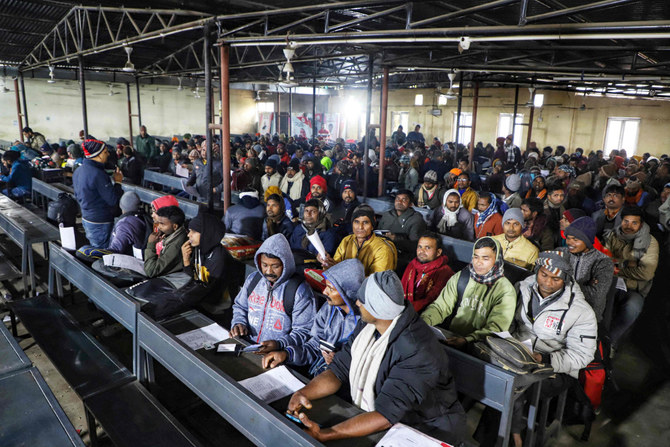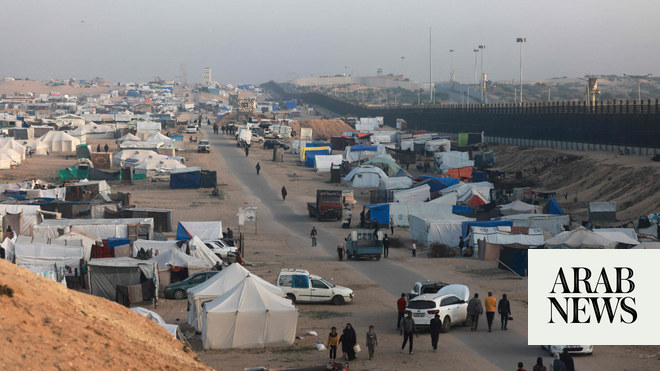
For the hundreds of Indians in line, the chance of a skilled construction job in Israel — and wages up to 18 times higher — outweighs their fears
India is the world’s fifth-largest economy and one of the fastest growing, but it has struggled to produce enough full-time and well-paying jobs for millions of people
LUCKNOW, India: Indians queuing in long lines for jobs in Israel as the war with Hamas grinds on say the risks to their safety are preferable to hunger at home.
Recruiters are aiming to fill a labor shortage in Israel exacerbated by nearly four months of fighting against Palestinian militants in Gaza.
While India is the world’s fifth-largest economy and one of the fastest growing, it has struggled to produce enough full-time and well-paying jobs for millions of people.
For the hundreds of Indians in line, almost all men, the chance of a skilled construction job in Israel — and wages up to 18 times higher — outweighs their fears.
“If it is written in our fate to die, we’ll die there — at least our kids will get something,” said motorbike mechanic Jabbar Singh, among the packed crowd at a training center and recruitment site in Lucknow, the capital of Uttar Pradesh state. “It’s better than hunger here.”
India’s urban unemployment rate — the percentage of people wanting work who cannot find a job — dipped to 5.1 percent in July 2022-June 2023, from 6.6 percent between the same months a year earlier.
Over the same period, nearly 22 percent of India’s workforce was classified as “casual labor,” with average monthly wages a paltry 7,899 rupees ($95), according to government figures.
Indian tile designer Deepak Kumar said it was a matter of “work for four days, eat for two days.”
Kumar said he followed the news and knew the risks, but wanted to find work for the sake of his children.
“I will smile and take a bullet — but will take 150,000 rupees ($1,800),” he said.
Indians working in Israel is a well-trodden path.
The Indian embassy in Tel Aviv says there are about 18,000 Indian citizens in Israel, “primarily caregivers” looking after the elderly, as well as others employed as diamond traders and IT professionals. Some are students.
But recruiters have launched a fresh drive for job seekers.
Raj Kumar Yadav, head of Lucknow’s Industrial Training Institute, said they were facilitating recruiters from Israel looking for 10,000 skilled construction workers who could earn as much as $1,685 a month.
“They will give them the visa and take the people with them on a chartered plane,” he said, adding that “10,000 families will be fed well and will grow.”
The program is supported by the authorities in both nations, he said.
India’s foreign ministry spokesperson Randhir Jaiswal told reporters last week there were long-existing employment agreements between the countries.
“We already have a large number of people, especially in the caregiving sector in Israel,” Jaiswal said, adding that the agreement helped to ensure “regulated migration.”
As the men queued in Lucknow, about 4,500 kilometers (2,800 miles) away, Israel stepped up its assault in the Gazan city of Khan Yunis, with the Palestinian Islamist movement Hamas saying dozens were killed in heavy bombardments and urban combat.
The war erupted on October 7 when Hamas and other militants from Gaza launched an unprecedented attack on Israel that resulted in about 1,140 deaths, according to an AFP tally of official Israeli figures.
Militants also seized 250 hostages, and Israel says around 132 remain in Gaza. That number includes the bodies of at least 28 dead hostages, according to an AFP tally based on Israeli figures.
Israel in response has vowed to crush Hamas, and launched a relentless military offensive that the Palestinian territory’s health ministry says has killed at least 25,900 people, about 70 percent of them women and children.
Thai and Nepali farm workers were among those killed and taken hostage in the Hamas attack. Some of the hostages have been released.
That provoked fear among foreign workers, many of whom fled after the attack, stripping the farm sector of a key source of labor.
Israel has also withdrawn 130,000 work permits from Palestinians in the occupied West Bank.
Indian workers provide one way to fill the gap.
Father of two Keshav Das said he felt he had no choice.
“There is no work here, so I will have to work somewhere,” Das told AFP. “I know I am going in the red zone. But I have to feed my family, so I will have to go out. Otherwise, my kids will die hungry.”












